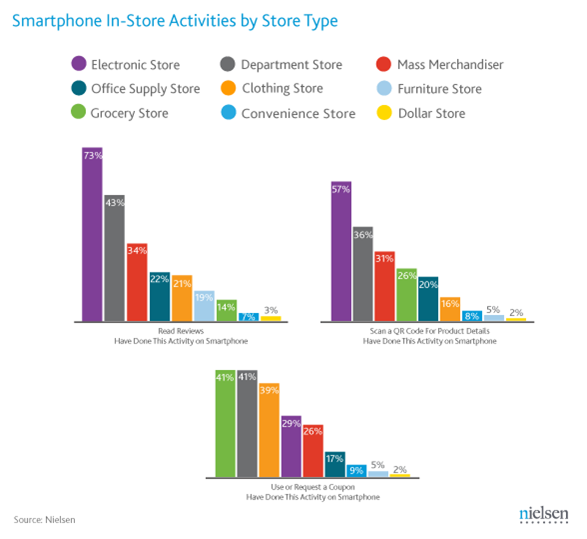The Evolution of In-Store Mobile Usage
by Alex from London
You walk into a retail store to buy your groceries, or products for your children, or DIY tools, or even a new swimsuit for the beach season. The retailer provides you with plenty of product information to make sure you get the best there is, from product demos and tips and tricks to reviews and discounts, all from your smartphone.
Conversely, you walk into a different retailer that offers no support for smartphone access. You either try to navigate the retailers’ official company website to find product information, or you visit the brands’ website directly—neither of which offer easy access to information.
Which retailer will you more likely come back to?
Most retailers know that smartphones have changed shoppers’ habits and are thus experimenting with ways to actively engage consumer smartphones, if only to address the treats of
showrooming.
But there are also signs that your mobile-addicted shoppers are potentially the most valuable: the
Adobe 2013 Mobile Consumer Survey, to which mobile users in the United States, Canada, United Kingdom, France, and Germany participated, showed that
shoppers who have scanned a QR Code in the past three months spent over $500 on consumer products is nearly double the amount of shoppers who did not (twenty-one percent to eleven percent, respectively).

My own field research shows that consumers use their smartphones differently depending on the type of retail store they are shopping in. For example, in home improvement retailers such as Home Depot, shoppers use their smartphones to look up product reviews, information and project designs.
In contrast, consumers shopping at grocery or apparel retailers are far more likely to use their smartphones to look for coupons redeemable in-store. These observations are corroborated by
Nielsen, whom measured
how smartphone activities changes with the type of store.

The shopper decision-making process is an iterative process, during which information and new ideas are continuously factored in. When shoppers use their smartphones during the purchase process, they are willing to share information about themselves, to enable retailers to provide relevant suggestions, ideas, coupons and sales offers. Retailers who use smartphones to multiply the touch points and expand, rather than narrow, the options for their shoppers have a competitive advantage over retailers who don’t.
Additional resources
Browse other ScanLife blog entries, or download our white paper -
The Showrooming Effect:How Retailers Can use QR Codes to Create Opportunity. You’ll find a wealth of information, ranging from the latest mobile barcode
trend report, to
QR Code tutorials, to the latest innovative
case studies.
Inspired? Why not join our Linkedin group “
Exchanging Smarter Ideas on Mobile Engagement“, check out our
website, or simply
contact us.
 My own field research shows that consumers use their smartphones differently depending on the type of retail store they are shopping in. For example, in home improvement retailers such as Home Depot, shoppers use their smartphones to look up product reviews, information and project designs.
In contrast, consumers shopping at grocery or apparel retailers are far more likely to use their smartphones to look for coupons redeemable in-store. These observations are corroborated by Nielsen, whom measured how smartphone activities changes with the type of store.
My own field research shows that consumers use their smartphones differently depending on the type of retail store they are shopping in. For example, in home improvement retailers such as Home Depot, shoppers use their smartphones to look up product reviews, information and project designs.
In contrast, consumers shopping at grocery or apparel retailers are far more likely to use their smartphones to look for coupons redeemable in-store. These observations are corroborated by Nielsen, whom measured how smartphone activities changes with the type of store.
